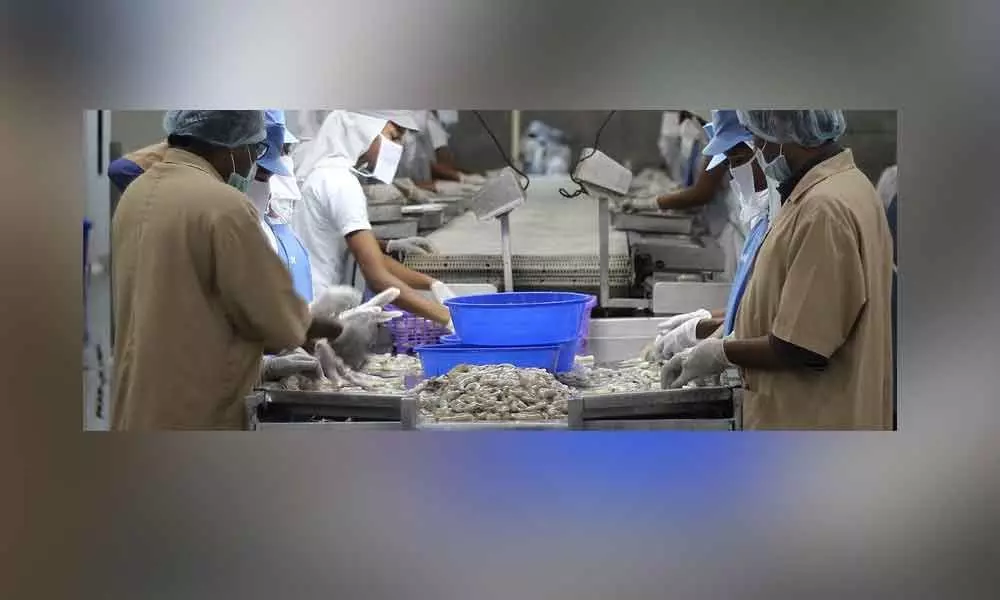Nellore: Aqua sector grapples with labour shortage
 Prawn processing unit in Nellore
Prawn processing unit in Nellore- Farmers finding it difficult to get workers to harvest the crop in aqua ponds Nellore produces around 5.75 lakh tonne aqua products worth Rs 15,000-Rs 16,000 cr annually, accounting for major share in export income to the state
- Several countries are also cutting down on imports from India owing to corona crisis
Nellore: Manpower shortage is haunting the aqua sector in the district which fetches around Rs 15,000-Rs 16,000 crore a year to the state exchequer through exports. Fears among fishing communities who work in hatcheries and aqua ponds led to shortage of workers even for collecting produce.
Further, locals workers are also afraid of working with mechanics from northern India who take care of machinery used in harvesting mistaking them for foreigners amid fears of coronavirus spread by people from overseas. As a result, the aqua farmers are facing an acute shortage of labourers from coastal mandals which is posing a grave danger to the sector even as the for products is same. Aquaculture, which used to be taken up in around one lakh acre in 16 coastal mandals in the district, has come down to 50,000-60,000 acre. The revenues from the sector are around Rs. 15,000-16,000 crore per year, which accounts a major share of income from exports from the state.
The aqua products are exported to Saudi Arabia, China, the US, South Africa, Israel, and other countries. Earlier, China was the major producer of aqua products, but the aquaculture in China was affected by various diseases. Consequently, these countries are importing the products from India. Nellore farmers also used to export to the European countries. However, of late, they stopped imports due to fears on coronavirus.
"The main reason for fears among the local population is that spread of coronavirus and the warnings by the officials. Now they take symptoms of a simple cold, cough coupled with fever as Covid-19 and are staying away from work at hatcheries though it is their main livelihood. A very limited number of people are attending paddy harvesting, post-harvesting, and for works in the aqua processing units," said P Mastan, of Allur mandal who belongs to the same community.
Apart from scarcity of workers, middlemen are creating doubts among farmers on the market situation though there shrimp yield is high. It was Rs 480 per 30-count prawn (30 pieces per kg) a fortnight ago and it came down to Rs. 400-410. "Now the major difficulty is shortage of workers. Very few are available for collecting prawns from ponds due to various reasons. Farmers are facing price-related losses due to delay in the process. The rate per 30-count in 1999 was Rs 500 and the cost of feed was Rs 42 per kg.
Now, in 2020, the cost of feed is only Rs 74.80 and still the farmers are getting Rs 480 for the same 30-count. Coronavirus threat is now impacting the prices indirectly," said Duvvuru Radha Krishna Reddy, president of AP State Prawn Farmer's Welfare Association. The district normally produces 5.75 lakh tonne aqua products every year.
According to sources from Kavali mandal, village collective institutions banned some some livelihood activities, with aqua sector being one of them. They are fearing the effect of coronavirus and prohibited the workers from attending the hatcheries and processing units. But the diktat is not being implemented in other coastal mandals. Between 30-40 per cent of workers are from Allur, Bogole, Indukurpet, Muthukur, TP Gudur and other mandals, Mastan says.
Former minister and TDP senior leader Somireddy Chandramohan Reddy appealed to the government to support the aqua farmers who are facing difficult situation with shortage of workers. The culture includes the collection of produce, shifting to processing units, and arrangements for exporting. All these are affected due to fears of coronavirus. He said most of the workers from Kerala have also left the district causing more troubles to the sector.

